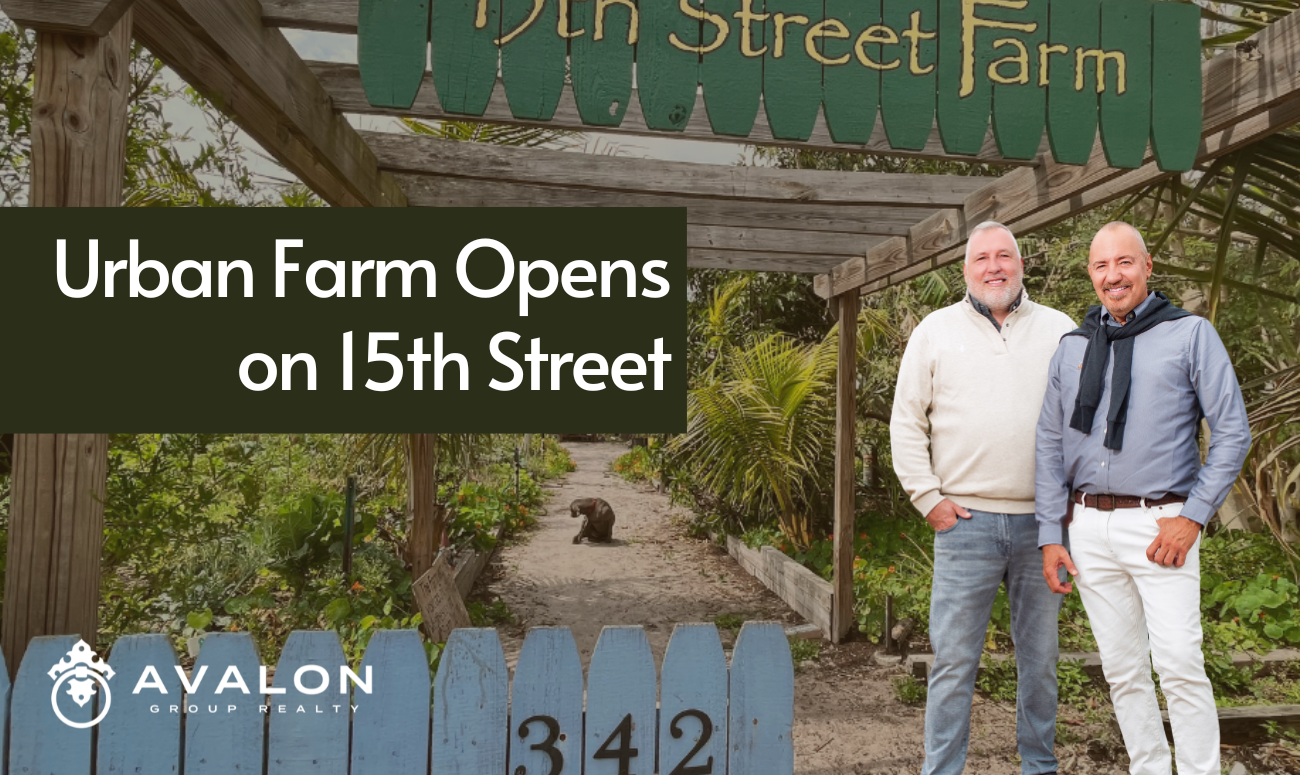Urban Farm Opens on 15th Street
St. Petersburg welcomes a fresh, vibrant addition to its community: 15th Street Farm, an innovative urban farm located at 342 15th St. N. This nonprofit farm combines education, sustainability, and community-building through its unique offerings. At its heart, the farm grows fresh, healthy produce using regenerative practices while fostering a deeper connection between people and their food.
Aaron Hunt, Broker of Avalon Group Realty, shares his excitement about the new venture: “15th Street Farm is more than just an urban oasis; it’s a hub for community learning and connection. This project is truly transformative for St. Petersburg.”
What Makes 15th Street Farm Unique?
At the core of 15th Street Farm is a half-acre organic farm utilizing regenerative practices that emphasize soil health and biodiversity. Alongside it, a 2,000-square-foot commercial kitchen and a wood-fired brick oven provide space for educational events, farm-to-table dinners, and hands-on cooking classes.
“This farm is a game-changer for urban living,” says Nora Sturgill, Realtor at Avalon Group Realty. “It offers an opportunity to experience sustainability firsthand and shows how urban farming can impact lives positively.”
Upcoming Events at 15th Street Farm
The farm’s calendar is packed with engaging activities:
- January 4: Farm tour and tasting experience.
- January 8: Open house showcasing the farm’s offerings.
- January 11: Saturday Yoga and Social Breakfast—a blend of wellness and community connection.
“These events are fantastic ways for locals to connect with their food sources and each other,” explains Yvette Kim, Realtor at Avalon Group Realty. “It’s not just about farming; it’s about building a stronger, more informed community.”
The Farm’s Educational Impact
15th Street Farm extends its influence beyond its half-acre plot through educational initiatives:
- Establishing 15+ school gardens for hands-on learning.
- Producing over 8,000 pounds of fresh produce annually.
- Composting 350+ tons of yard waste.
- Engaging with more than 8,000 students each year.
Pam Amante, Realtor at Avalon Group Realty, reflects on the farm’s mission: “Programs like these teach children to value where their food comes from, fostering a sense of responsibility for their environment.”
Volunteer and Support Opportunities
Supporters can contribute to the farm’s success by donating online or volunteering. There are numerous ways to get involved:
- Attend a farm-to-table dinner.
- Participate in a cooking class.
- Join a guided farm tour.
“Every visit helps sustain the mission of 15th Street Farm,” says Josh Zanow, Realtor at Avalon Group Realty. “It’s rewarding to know your participation directly impacts community growth.”
What is Urban Farming?
Urban farming, or urban agriculture, is the practice of cultivating crops, raising livestock, or growing food within city environments. Historically, urban farming dates back to ancient Mesopotamia and has been a vital component of city life during critical periods, such as the Victory Gardens of World War II. Today, urban farming is a cornerstone of sustainable living.
Expanding Community Impact
The impact of 15th Street Farm reaches far beyond the confines of its physical space. Through collaborations with local schools, civic organizations, and other nonprofits, the farm is creating a network of change that benefits the entire community. One of its key goals is to address food insecurity in urban neighborhoods by providing access to fresh produce for underserved populations. In addition, the farm works closely with local businesses to promote sustainable practices, ensuring that its influence is felt throughout St. Petersburg.
The farm’s regenerative agriculture techniques not only produce nutrient-rich food but also serve as a model for raising clean non genetically modified food.. By emphasizing soil health, crop diversity, and waste reduction, the farm demonstrates how small-scale urban initiatives can have a significant environmental impact. Our environment is filled with toxins and developing a clean food plan is important part of promoting healthy living creating an environment for the body to heal itself with proper nutrition..
Community members can also engage with the farm’s mission through specialized workshops that cover topics such as permaculture, composting, and water conservation. These sessions empower individuals to adopt sustainable practices in their own homes, creating a ripple effect of environmental consciousness across the city. “Education is the cornerstone of lasting change,” says Nora Sturgill. “When people understand the value of sustainable practices, they’re more likely to take meaningful action.”
The farm’s integration of art and culture further enriches its offerings. Partnerships with local artists bring a creative dimension to the space, making it a hub for cultural expression. From mural painting events to seasonal art shows, 15th Street Farm becomes more than a place to grow food—it transforms into a sanctuary where creativity and community thrive together.
Collaboration is at the heart of the farm’s success. Regular community forums invite input from residents, ensuring that the farm’s initiatives align with the needs and aspirations of those it serves. By fostering open dialogue, the farm strengthens its bond with the community, ensuring a shared sense of ownership and pride.
The farm also plays a vital role in supporting mental and physical health. Gardening has been shown to reduce stress, improve mood, and enhance overall well-being. By offering programs that encourage hands-on involvement, the farm provides a therapeutic escape from the hustle and bustle of urban life. “There’s something profoundly healing about connecting with the earth,” reflects Pam Amante. “15th Street Farm gives people a space to reconnect with themselves and their surroundings.”
Benefits of Urban Farming
Urban farming offers several benefits:
- Locally Raised Products: Reduces energy use associated with transporting food.
- Efficient Land Use: Practices like vertical farming maximize production per square foot.
- Redevelopment: Transforms unused urban spaces into vibrant gardens.
- Community Building: Strengthens ties among residents while beautifying neighborhoods.
Sophia Birbilis, Realtor at Avalon Group Realty, notes, “Urban farming is not just about sustainability; it’s about reimagining how we live in cities and fostering a sense of belonging.”
Types of Urban Farming
The U.S. Department of Agriculture identifies four main types of urban farming:
Community Gardens
Community gardens are small plots run by volunteers, often on public or abandoned land. They’re excellent for beautifying neighborhoods but may face challenges such as zoning issues and soil quality concerns.
Community Farms
Managed by nonprofit organizations, community farms offer educational programs and aim to enrich their communities.
Commercial Farms
For-profit operations often located indoors, these farms focus on niche produce and use advanced techniques like vertical farming.
Institutional Farms and Gardens
Associated with institutions like schools or hospitals, these gardens emphasize education and enrichment over large-scale production.
Urban Farm Opens on 15th Street: A Milestone for St. Petersburg
The launch of 15th Street Farm marks a significant milestone in St. Petersburg’s journey toward sustainability and community well-being. Its diverse offerings, from fresh produce to educational programs, promise long-lasting benefits for the area.
Aaron Hunt sums it up best: “The farm represents everything we love about St. Petersburg—innovation, community, and a commitment to a better future.”
FAQ
What is 15th Street Farm?
15th Street Farm is a nonprofit urban farm in St. Petersburg that grows organic produce and offers educational programs, cooking classes, and events.
Where is 15th Street Farm located?
It’s located at 342 15th St. N, St. Petersburg, FL.
How can I support the farm?
You can support the farm by donating online, volunteering, or attending events like farm-to-table dinners and cooking classes.
What are the farm’s key initiatives?
The farm focuses on sustainability, education, and community-building. It operates 15+ school gardens and composts over 350 tons of yard waste annually.
How do I get involved?
Visit their website for details on volunteering, attending events, or supporting their mission through donations.
Conclusion
The opening of 15th Street Farm brings hope and inspiration to St. Petersburg. It’s a testament to the power of community-driven projects in transforming urban spaces into centers of sustainability and learning.
Discover more about St. Petersburg’s vibrant community and real estate opportunities:
Contact Aaron Hunt directly to start your real estate success story: Phone: 727-262-7920
Follow us for more Tampa Bay real estate tips, market updates, and insider information:
Facebook: AvalonGroupTampaBay
Instagram: avalongrouprealtors
Twitter: @AVALONGROUPRE
LinkedIn: Avalon Group Realty
TikTok: @avalongrouprealty




